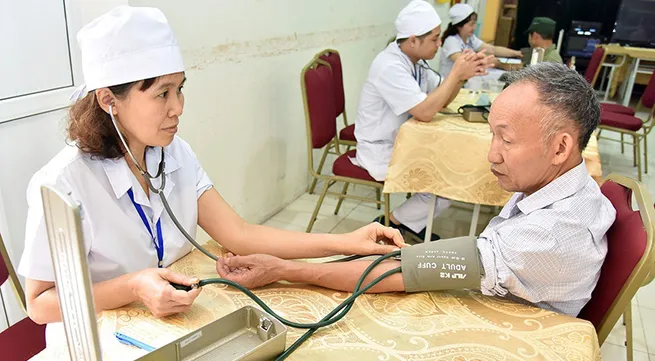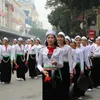Caring for the elderly through health and social insurance policies

It is forecast that by 2035, the elderly will account for 20% of the population and Vietnam will become a country with an elderly population. Rapid aging of the population is posing major challenges so it is necessary to change the social security system, labour, employment, entertainment, and especially the health care system for the elderly in Vietnam.
In 2016, the Ministry of Health developed a scheme on health care for the elderly for the 2017-2025 period, striving to reach a target of 100% of the elderly having health insurance cards. By the end of 2020, the country had about 12.1 million elderly people having health insurance cards, accounting for 95% of the total number of the elderly and there remains about 5% of the elderly from poor households without health insurance.
There are 97 central and provincial hospitals with geriatrics departments and 918 clinics with separate examination rooms or areas for the elderly. There are more than 8,000 priority inpatient beds for the elderly. Currently, there are nearly 3.4 million older persons being examined and consulted about primary healthcare; with health management records and periodic health examinations.
According to statistics, currently about 5% of the elderly do not have health insurance cards, but this number may in fact be even higher. It can be seen that most Vietnamese elderly are still living in rural areas with their children and grandchildren, and their material life still faces many difficulties. Elderly people often face the burden of "double diseases", suffering from multiple chronic diseases. On average, each elderly has three diseases with high treatment costs.
Meanwhile, the health care system in general and primary health care in particular have not been adapted to the rapidly-aging population of the country. There are still many localities that have not been able to allocate funds to make health monitoring records, periodical medical examination and treatment for the elderly. This requires early implementation of various types of long-term health care in the community and social security policies to ensure the elderly have comprehensive health care.
At a recent conference on reviewing work regarding the elderly in 2020 and implementing tasks for 2021, Deputy Prime Minister Vu Duc Dam who is also Chairman of the National Committee for the Vietnamese Elderly said that in 2021, Vietnam would strive to implement health insurance support for 500,000 needy elderly people currently without health insurance cards.
Regarding the implementation of policies on health and social insurance for the elderly, Deputy General Director of Vietnam Social Security (VSS) Tran Dinh Lieu said that, regarding the implementation of Resolution 28-NQ/TW of the Party Central Committee on reforming policies on social insurance and social insurance, the VSS has issued health insurance cards to nearly 13 million elderly people, aged 60 and over. In 2020, the country had nearly 1.1 million more people participating in voluntary social insurance, of which, the proportion of the elderly participating is large, especially those aged 50 and over.
The participation of the elderly in social insurance policy, especially voluntary social insurance, will create a long-term and sustainable social security foundation. Proposing the development of a specific project and roadmap to attract older persons to participate in voluntary social insurance, Deputy General Director Lieu said that, in the short term, as the Law on Social Insurance has not been amended, it is still possible to increase the level of State budget support for voluntary social insurance participants in each group. For the elderly, the amount of support is not large, estimated at less than VND200 billion per year.
In the near future, ministries, branches and localities should focus on policies related to the elderly, closely linking these with multidimensional poverty eradication. It is necessary to promote information dissemination; work out plans to assign tasks to each locality, and pay special attention to the elderly in society. The relevant ministries, branches and localities should also synthesise State resources for policy beneficiaries, including the elderly, in the spirit of effective resource allocation, and gradually reduce direct support, turning to supporting the elderly by creating conditions for them to develop production, business, economic development; while at the same time gradually combining direct supports and support through insurance policies for the elderly in difficult circumstances.
Tags:





